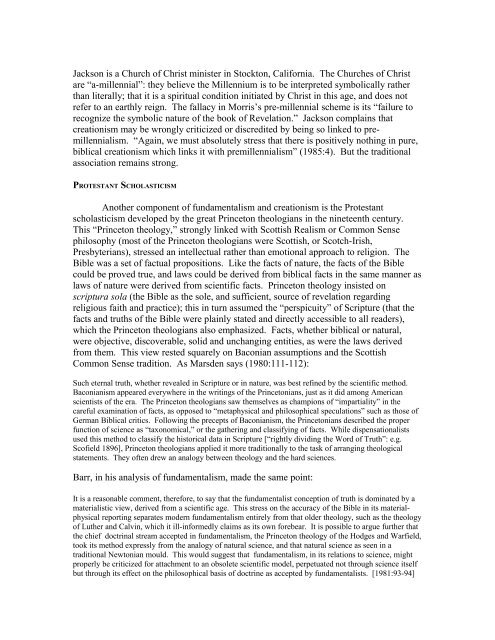Creationism - National Center for Science Education
Creationism - National Center for Science Education
Creationism - National Center for Science Education
You also want an ePaper? Increase the reach of your titles
YUMPU automatically turns print PDFs into web optimized ePapers that Google loves.
Jackson is a Church of Christ minister in Stockton, Cali<strong>for</strong>nia. The Churches of Christ<br />
are “a-millennial”: they believe the Millennium is to be interpreted symbolically rather<br />
than literally; that it is a spiritual condition initiated by Christ in this age, and does not<br />
refer to an earthly reign. The fallacy in Morris’s pre-millennial scheme is its “failure to<br />
recognize the symbolic nature of the book of Revelation.” Jackson complains that<br />
creationism may be wrongly criticized or discredited by being so linked to premillennialism.<br />
“Again, we must absolutely stress that there is positively nothing in pure,<br />
biblical creationism which links it with premillennialism” (1985:4). But the traditional<br />
association remains strong.<br />
PROTESTANT SCHOLASTICISM<br />
Another component of fundamentalism and creationism is the Protestant<br />
scholasticism developed by the great Princeton theologians in the nineteenth century.<br />
This “Princeton theology,” strongly linked with Scottish Realism or Common Sense<br />
philosophy (most of the Princeton theologians were Scottish, or Scotch-Irish,<br />
Presbyterians), stressed an intellectual rather than emotional approach to religion. The<br />
Bible was a set of factual propositions. Like the facts of nature, the facts of the Bible<br />
could be proved true, and laws could be derived from biblical facts in the same manner as<br />
laws of nature were derived from scientific facts. Princeton theology insisted on<br />
scriptura sola (the Bible as the sole, and sufficient, source of revelation regarding<br />
religious faith and practice); this in turn assumed the “perspicuity” of Scripture (that the<br />
facts and truths of the Bible were plainly stated and directly accessible to all readers),<br />
which the Princeton theologians also emphasized. Facts, whether biblical or natural,<br />
were objective, discoverable, solid and unchanging entities, as were the laws derived<br />
from them. This view rested squarely on Baconian assumptions and the Scottish<br />
Common Sense tradition. As Marsden says (1980:111-112):<br />
Such eternal truth, whether revealed in Scripture or in nature, was best refined by the scientific method.<br />
Baconianism appeared everywhere in the writings of the Princetonians, just as it did among American<br />
scientists of the era. The Princeton theologians saw themselves as champions of “impartiality” in the<br />
careful examination of facts, as opposed to “metaphysical and philosophical speculations” such as those of<br />
German Biblical critics. Following the precepts of Baconianism, the Princetonians described the proper<br />
function of science as “taxonomical,” or the gathering and classifying of facts. While dispensationalists<br />
used this method to classify the historical data in Scripture [“rightly dividing the Word of Truth”: e.g.<br />
Scofield 1896], Princeton theologians applied it more traditionally to the task of arranging theological<br />
statements. They often drew an analogy between theology and the hard sciences.<br />
Barr, in his analysis of fundamentalism, made the same point:<br />
It is a reasonable comment, there<strong>for</strong>e, to say that the fundamentalist conception of truth is dominated by a<br />
materialistic view, derived from a scientific age. This stress on the accuracy of the Bible in its materialphysical<br />
reporting separates modern fundamentalism entirely from that older theology, such as the theology<br />
of Luther and Calvin, which it ill-in<strong>for</strong>medly claims as its own <strong>for</strong>ebear. It is possible to argue further that<br />
the chief doctrinal stream accepted in fundamentalism, the Princeton theology of the Hodges and Warfield,<br />
took its method expressly from the analogy of natural science, and that natural science as seen in a<br />
traditional Newtonian mould. This would suggest that fundamentalism, in its relations to science, might<br />
properly be criticized <strong>for</strong> attachment to an obsolete scientific model, perpetuated not through science itself<br />
but through its effect on the philosophical basis of doctrine as accepted by fundamentalists. [1981:93-94]

















